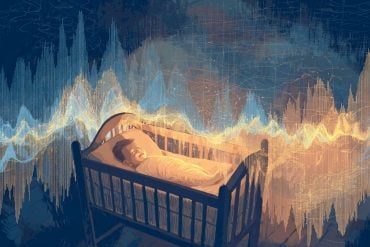Summary: Researchers have discovered that the best sleep for older adults comes at bedroom temperatures between 68 and 77°F. Beyond this range, sleep efficiency can plummet by 5-10%.
The study emphasizes the need for personalized temperature settings in the homes of the elderly. It also raises concerns about the impact of rising global temperatures on the sleep quality of older, especially low-income, adults.
Key Facts:
- The study leverages real-world data, capturing nearly 11,000 person-nights of sleep from 50 older adults to determine the impact of ambient temperature on sleep.
- Sleep efficiency in older adults dips by 5-10% when bedroom temperatures rise from 77 to 86°F.
- This research has far-reaching implications, not just for individual health but also for understanding how climate change could disproportionately affect the sleep quality of disadvantaged older adults.
Source: Hebrew SeniorLife Hinda and Arthur Marcus Institute for Aging Research
New research finds that sleep can be most efficient and restful for older adults when nighttime bedroom ambient temperature ranges between 68 to 77 °F.
The authors observed an overall trend: a 5-10 % drop in sleep efficiency as the nighttime ambient temperature increases from 77°F to 86°F. Importantly, this research also reveals substantial between-individual differences in optimal bedroom temperature.

“These results highlight the potential to enhance sleep quality in older adults by optimizing home thermal environments and emphasizing the importance of personalized temperature adjustments based on individual needs and circumstances,” said lead researcher Amir Baniassadi, PhD, Hinda and Arthur Marcus Institute for Aging Research at Hebrew SeniorLife, and Harvard Medical School.
“Additionally, the study underscores the potential impact of climate change on sleep quality in older adults, particularly those with lower socioeconomic status, and supports increasing their adaptive capacity as nighttime temperatures increase in cities across the country,” Baniassadi said.
This longitudinal observational study examines the association between bedroom nighttime temperature and sleep quality in a sample of community dwelling older adults.
Using wearable sleep monitors and environmental sensors, researchers monitored sleep duration, efficiency, and restlessness over an extended period within participants’ homes while controlling for potential confounders and covariates.
The study collected nearly 11,000 person-nights of sleep and environmental data from 50 older adults. The associations were primarily nonlinear, and substantial between-subject variations were observed.
The findings were published in the article, Nighttime ambient temperature and sleep in community-dwelling older adults, appearing in Science of The Total Environment.
Authors were Amir Baniassadi; Brad Manor, PhD, Hinda and Arthur Marcus Institute for Aging Research at Hebrew SeniorLife, and Harvard Medical School; Wanting Yu, ME, Hinda and Arthur Marcus Institute for Aging Research at Hebrew SeniorLife; Thomas Travison, PhD, Hinda and Arthur Marcus Institute for Aging Research at Hebrew SeniorLife, and Harvard Medical School; and Lewis Lipsitz, MD, Hinda and Arthur Marcus Institute for Aging Research at Hebrew SeniorLife, and Harvard Medical School.
Older adults often experience inadequate, restless, and disrupted sleep which in turn influences many outcomes related to their health and wellbeing such as cognitive and physical function, mood and affect, irritability and reaction to stress, productivity, diabetes management, and risk of cardiovascular diseases.
Indeed, poor sleep is disproportionately more common among older adults. Meanwhile, research on its causes has been mostly focused on physiological and behavioral factors despite evidence suggesting that the environment the person sleeps in can be as influential.
As a result, while numerous medical and behavioral interventions have been developed to improve outcomes related to sleep, the potential of environmental interventions have been largely overlooked.
Within this context, the link between home ambient temperature and sleep within older adults can be a potential target for improving sleep, which motivated the researchers to conduct this study.
The authors plan to continue this line of work by focusing on the potential impact of climate change on sleep in low-income older adults and developing interventions to optimize their environment.
This study was supported by TMCITY foundation. Additionally, Baniassadi acknowledges support by a T32 fellowship through U.S. National Institute on Aging (T32AG023480).
About this sleep research news
Author: Michael Chmura
Source: Hebrew SeniorLife Hinda and Arthur Marcus Institute for Aging Research
Contact: Michael Chmura – Hebrew SeniorLife Hinda and Arthur Marcus Institute for Aging Research
Image: The image is credited to Neuroscience News
Original Research: Closed access.
“Nighttime ambient temperature and sleep in community-dwelling older adults” by Amir Baniassadi et al. Science of the Total Environment
Abstract
Nighttime ambient temperature and sleep in community-dwelling older adults
This longitudinal study examines the association between bedroom nighttime temperature and sleep quality in a sample of community dwelling older adults.
Using wearable sleep monitors and environmental sensors, we assessed sleep duration, efficiency, and restlessness over an extended period within participants’ homes while controlling for potential confounders and covariates.
Our findings demonstrated that sleep was most efficient and restful when nighttime ambient temperature ranged between 20 and 25 °C, with a clinically relevant 5–10 % drop in sleep efficiency when the temperature increased from 25 °C to 30 °C. The associations were primarily nonlinear, and substantial between-subject variations were observed.
These results highlight the potential to enhance sleep quality in older adults by optimizing home thermal environments and emphasize the importance of personalized temperature adjustments based on individual needs and circumstances.
Additionally, our study underscores the potential impact of climate change on sleep quality in older adults, particularly those with lower socioeconomic status, and supports increasing their adaptive capacity in the face of a changing climate.






